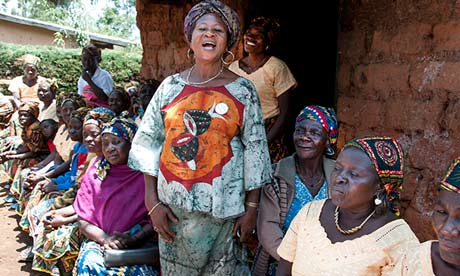The look of African politics is decidedly male. Leaders fall into the "grand statesman" mould, Nelson Mandela; the tyrant, Charles Taylor and Sani Abacha; misunderstood man of the people, Robert Mugabe; and the curiously long-lasting, Equatorial Guinea's Teodoro Obiang and Angola's José Eduardo dos Santos. In recent years, however, things have begun to look a little less XY. In 2006, Ellen Johnson Sirleaf was elected president of Liberia, and five years later, won a second term. In April last year, Malawi elected its first female president, Joyce Banda; Forbes placed her as the 47th most powerful woman in the world. Only last week, Aminata Touré was elected as prime minister of Senegal (although her cabinet consists of four women and 28 men).
Last year, the executive director of UN Women, Michelle Bachelet, called for "stronger commitment by leaders to increase women's participation in politics", and went on to argue that quotas were the way to change the gender inequality at the heart of so many national parliaments. The often-lauded Scandinavian countries of Norway, Sweden and Denmark have high rates of female representation at parliamentary level: 40%, 45% and 39% respectively, according to the World Bank. But they pale in comparison with the small central African state of Rwanda, which stands at a whopping 56% – the highest proportion of female parliamentarians in the world and well above its 30% quota. By contrast, the UK has a middling 23%. A report by UN Women and the Inter-Parliamentary Union (IPU) found that 17 of the 59 countries that held elections in 2011 had introduced quotas and, in those 17, women gained 27% of parliamentary seats, compared with 16% in those without quotas.
Quotas are very much on the minds of the would-be candidates gathered at the training session in Cameroon, as local and parliamentary elections will take place on 30 September. This will be the first election in which the parties have been pressured by campaigners into meeting them. Quotas – and other routes to equal representation – are also being closely monitored by Voluntary Service Overseas (VSO), which last summer launched its Women In Power campaign, working to increase the involvement of women in decision-making at all levels.
On Tuesday 10 September, VSO volunteers will be holding a mass lobby of parliament – timed to coincide with the attendance of the international development secretary Justine Greening at the UN General Assembly – on the issue of women's political participation around the world. The lobby will be followed by a 40-page report looking at the causes and effects of gender imbalance among decision-makers, and how to reduce the barriers to political participation.
The fact that quotas alone are not the answer looks evident in Cameroon, where the main parties instituted a 30% female quota target over recent years, but few councils adhere to it. In the city of Bamenda, a local NGO, Community Initiative for Sustainable Development (Cominsud), is working with VSO to mobilise women and minority candidates to become councillors. The feedback reported a lack of confidence and ignorance of the electoral system. "We built up a training programme to get to these women – how to build up their confidence, how to campaign and so on," says Bih Pascaline, lead project staff on the Democracy and Empowerment of Women programme at Cominsud. So far, they have trained more than 450 women.
In Rwanda, the 30% quota has been exceeded ever since it was introduced, and neighbouring countries in the region are not too far behind: Burundi and Uganda have female parliamentary representation at over 30% as well. What makes Rwanda so successful? Dr Agnes Matilda Kalibata has been minister for agriculture since 2008. She puts the higher-than-average proportion of women in office down to a restructuring of Rwandan society post-genocide. "Bringing women out of the home and fields has been essential to our rebuilding," she told the Washington post in 2008. "We are becoming a nation that understands that there are huge financial benefits to equality." Elections are due on 16-18 September, and there are 204 women competing for 80 seats in the lower house. With a quota for young people and a reserved seat for a candidate with disabilities, women are expected to win more than the 24 seats allocated to them again.
 Florence Woazineh, an agro-socio economist specialising in rural economics, who has been training women in Cameroon on getting involved in politics. Photograph: Jenny Matthews/VSO
Florence Woazineh, an agro-socio economist specialising in rural economics, who has been training women in Cameroon on getting involved in politics. Photograph: Jenny Matthews/VSO 
